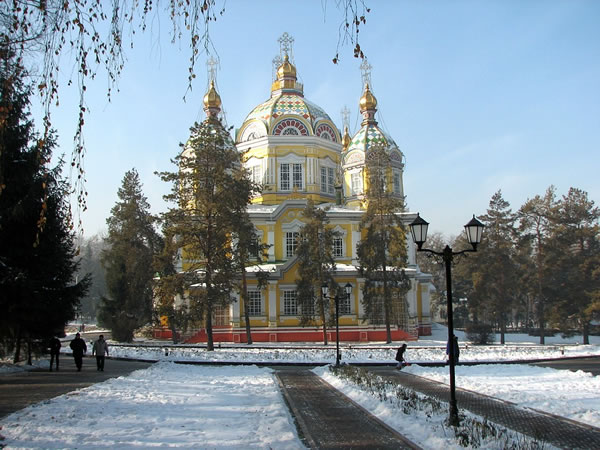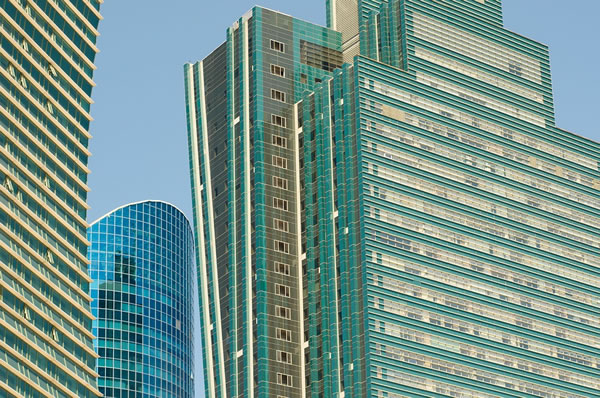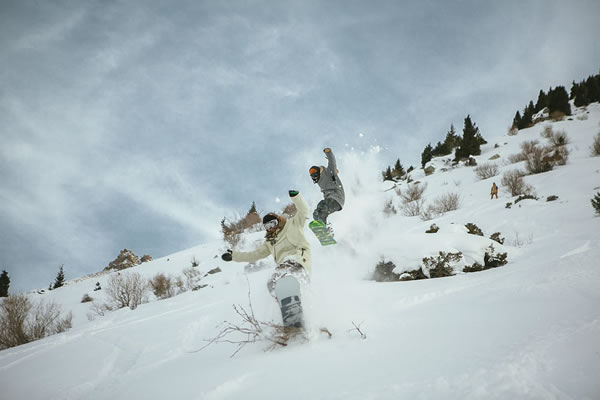Living Abroad in the Real Kazakhstan
Eager to Attract Foreign Expertise
by Paul Bartlett

|
|
The Zenkov Cathedral in Almaty, Kazakhstan.
|
It’s funny what difference a year can make. When I told family and friends that I was moving to Kazakhstan they looked at me blankly and asked “Pakistan?” Now in the wake of Borat Sagdiev’s
notorious antics, it seems that everyone has heard of this Central Asian state.
Borat’s backward home country is one supposedly populated by misogynists, racists, and perverts. The reality is somewhat different, as visitors to this vast country in Central Asia can testify. Kazakhstan is a country
of contrasts−dynamic, go-ahead modern cities surrounded by beautiful, unspoilt nature. The people are open and hospitable. Kazakhstan is a melting-pot of different nationalities — estimates put the number of resident ethnic groups
to be in excess of 130. The country prides itself on having achieved a great degree of ethnic harmony with Kazakhs, Russians, Ukranians, Uzbeks, Uighurs, and Turks just a few of the different groups living side by side with few problems.
I moved to Almaty, the country’s vibrant commercial and cultural capital, in August 2005 to work as a teacher trainer in a university. Kazakhstan is a huge country, the ninth largest in the world by landmass, with
a small population of around 15 million. For the last few years the economy has been booming with petrodollars and you can see the results in the skyscrapers of Astana, the capital, and in the trendy shops and cafes of Almaty.
Kazakhstan is Central Asia’s undisputed economic powerhouse and Almaty is the business hub of the region. The Almaty Financial District, which is taking shape in the south of the city, reflects its ambition to be
a significant player in Asia. More top of the range 5-star hotels are opening their doors, and Almaty is home to many multinational companies.
Astana is a gleaming city of glittering skyscrapers in the middle of the windswept steppe: the purpose-built city is the grandiose vision of the president, Nursultan Nazarbayev, who ordered the capital moved here from
Almaty in 1997. Astana is where ambitious young Kazakhs go to get ahead. It is a windswept city, home to government workers and diplomats, and lacks the buzzing nightlife and cultural life of Almaty.

|
|
Luxury apartments in Astana.
|
Work and Living
in Kazakhstan
While there are a lot of opportunities for work in the oil and gas industry, Kazakhstan is keen to develop other spheres in order to avoid over-reliance on its mineral wealth. Key areas include tourism, finance,
and the service industry. To achieve this diversification, the country is keen to attract foreign expertise.
In my sphere, education, there are openings in the numerous universities, private language schools, and international schools. Native-speaker teachers are in short supply so even newly qualified teachers should have no
trouble finding work. Demand for foreign languages is high and there are many openings for EFL teachers. But don’t expect to make your fortune here; salaries tend to be relatively low and day-to-day living costs in Kazakhstan are high.
Property prices in Kazakstan have rocketed over the last few years as demand outstrips supply. Some friends of mine were given a $3,000 one-room apartment in Almaty as a wedding present six years ago — it’s
now worth around $70,000. The cheapest 1-room apartments on the edge of the city center cost around $400 per month to rent. New apartment buildings are springing up all over the place.
For the well-heeled, luxury houses and dachas located on the edges of the city are increasingly popular options.
Kazakh Culture
Although the SUV is ubiquitous in cities, the horse still plays a major role in Kazakhstan. Horse-racing is popular in the summer months in Almaty, along with more traditional horse games such as kyz kuu, tenge alu, kokpar, and audaryspak. Kyz kuu is a form of horseback kiss chase and tenge alu is a feat of superb riding skill where the rider attempts to pick up a silver coin while moving at a swift gallop.
Kokpar is the Central Asian variant of polo played with the body of a headless goat; it’s a fast and furious competition with riders battling to steal the carcass from each other in order to deposit it in the goal.
Audaryspak gives an equine flavor to another favorite Kazakh sport, wrestling, as the two contestants grapple on horseback aiming to unseat each other.
Ethnic Kazakhs are a superstitious lot — I have been told off for whistling, sitting in the Kazakh mourning position and asking people where they are going. Serious transgressions that will cause offence include being
disrespectful to food, in particular bread, wearing your shoes indoors, blowing your nose in public, pointing to the sky and putting your bum or feet on pillows. Kazakhs are great believers in the malign influence of the evil eye and will use
charms and amulets to fend it off.
Language
Language has become a contentious issue in Kazakhstan. The state language is Kazakh and moves are afoot to strengthen its presence in the public domain. Russian remains an important communication language both within
the country and the former Soviet Union. But its position is likely to be diminished with time as Kazakh becomes more widespread. English has become increasingly popular as an international language with more and more people studying abroad
and doing business with foreign counterparts.
For the moment you can get by with just Russian in the main towns and cities but if you’re planning on staying long term you may want to consider learning Kazakh. Tensions between Kazakh and Russian speakers are
beginning to come more to the surface. Some ethnic Kazakhs resent the failure of large parts of the population to learn Kazakh, the state language. I was in a restaurant in Astana recently when an ethnic Kazakh guy started shouting at the head
waitress, an ethnic Russian, telling her in no uncertain terms to “go back to Russia”. Fortunately, such incidents are rare.
Eating and Drinking
The people in Kazakhstan are a sociable lot–they need no excuse for a party. Almaty and Astana have a number of swanky bars and cafes which open around the clock. Tastes are very cosmopolitan these days and
you can choose from Kazakh, Russian, Turkish, Chinese, Italian, Lebanese, Thai, and Georgian.
Kazakh food is very meat-based. Ethnic Kazakhs were traditionally nomadic roaming the steppe with their livestock; vegetables were hard to come by so horsemeat, camel meat and mutton made up the bulk of the nomad’s
diet. Kazy, horsemeat sausage, remains a favorite and the national dish is besbarmak, consisting of meat and strips of pasta with the broth drunk separately. The name means “five fingers” and refers to the way the dish was traditionally
eaten. Kumis, a mildly alcoholic drink of fermented mare's milk, is a traditional tipple, but nowadays beer, vodka, and wine are just as likely to be drunk with a meal.
Freetime
You will never be short of things to do and see in Kazakhstan. Almaty has the Zailisky Alatau mountain range on its doorstep which offers winter sports such as skiing and snowboarding at the resort of Shymbulak and
outdoor ice-skating at Medeu stadium. These mountains are also great in the summer months for trekking and climbing.
The nearby Kapshagay reservoir has sandy beaches and safe swimming. It has been chosen as the site for the Kazakh version of Las Vegas as the casinos are moved out of the main cities. Five hours’ drive from Almaty
is Sharyn Canyon, which rivals the Grand Canyon in its beauty, and the singing sand dunes in the Altyn-Emel national park are an unusual attraction.
In winter, Astana has an ice town where you can speed down ice slides and see the Taj Mahal, Big Ben, the Eiffel Tower or the Acropolis, all constructed from blocks of ice. A few hours, drive from Astana is the picturesque
Lake Burabay, which is surrounded by dense forest and has unusual rock formations. Another nearby lake, Tengiz, has the world’s most northerly colony of pink flamingos.

|
|
Many snowboarding and skiing options in the Zailisky Alatau mountain range.
|
The “Borat Effect”
Kazakhstan is a vibrant and welcoming country and now that the “Borat effect” has put it on the map more, people are starting to discover its attractions. The national carrier, Air Astana, is increasing
the frequency of its London flights to satisfy increased interest in the country, and U.K. banks are reporting increased demand for tenge, the Kazakh currency.
It’s a place of fascinating contrasts between the old and the new, the city and the country, tradition and modernity. The country has left its Soviet past far behind and the people are upwardly mobile, driving the
latest SUVs and wearing designer gear. With the economy opening up, foreign expertise is in high demand. Kazakhstan is a great place for those who like to work hard and also like to play hard.
Paul Bartlett lives in Almaty, Kazakhstan where he works as a freelance writer and ESOL teacher trainer. Before moving to Almaty he lived and worked in Uzbekistan, Russia, Spain, Greece, the Czech Republic and his home country
of England.
|